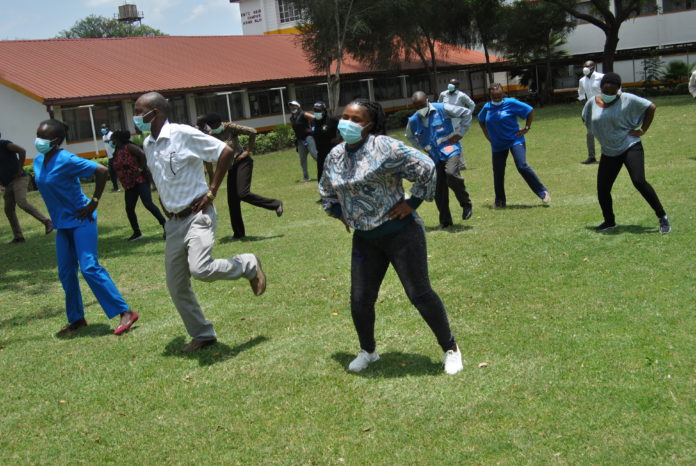When Kenya recorded a first COVID-19 case in March, the government announced the closure of learning institutions in the country and eventually picked a few of them to be isolation centers for those who were traveling into the country as well as those who had been found to be positive.
Fridah Kibiti, a Nairobi-based nurse was deployed by her employer to the COVID-19 isolation and quarantine center at the Kenya Medical Training College (KMTC) five months ago, and she didn’t think much of it.
In August, Kibiti was tested for the virus after she developed flu and started sneezing, and was found to be positive. She had contracted COVID-19.
“I came for the night shift on a Wednesday and upon being given supper, I felt that food was tasteless,” she says.

Overwhelmed already by the care she was expected to give to her patients, Kibiti now had another challenge to add to her situation: that of fighting to recover from COVID-19. She was in need of psychosocial support, together with her colleagues who had been in the frontline in the fight against the disease at the center.
At the KMTC which is affiliated to Kenya’s leading public hospital, the Kenyatta National Hospital in the capital, Nairobi, Kibiti, together with her colleagues is engaging in weekly Zumba dances to ease their minds and make themselves feel better. Apart from the dance, the health workers also get psychosocial support from Amref Health Africa through funding from the EU.
According to the World Health Organization of the United Nations (WHO), COVID-19 has exposed health workers and their families to unprecedented levels of risk. Although not representative, data from many countries across WHO regions indicate that COVID-19 infections among health workers are far greater than those in the general population. Dr. Tedros Adhanom Ghebreyesus, the WHO Director-General stresses the importance of keeping these health workers safe.
“The COVID-19 pandemic has reminded all of us of the vital role health workers play to relieve suffering and safe lives,” said Dr. Ghebreyesus. “No country, hospital, or clinic can keep its patients safe unless it keeps its health workers safe. WHO’s Health Worker Safety Charter is a step towards ensuring that health workers have safe working conditions, the training, the pay, and the respect they deserve.”
The Charter, released last month for World Patient Safety Day, called on governments and those running health services at local levels to take five actions to better protect health workers. These included steps to protect health workers from violence; to improve their mental health; to protect them from physical and biological hazards; to advance national programs for health worker safety, and to connect health worker safety policies to existing patient safety policies.
Doctor Caro Ngunu the head of the Division for Communicable Diseases who has been responsible for case management and prevention says that the Zumba and dance activity assists the health worker to debrief.

“COVID-19 is associated with a lot of stigma and the number of hours that we are working coupled also with the kind of environment within isolation and quarantine sites can be quite stressful and so it takes care of the mental wellbeing of the healthcare workers and that is why we regularly conduct it. It also brings people together, enhances teamwork,” says Dr. Ngunu.
The Psychosocial First Aid (PFA) sessions were established to provide psychosocial support to staff who are working at the isolation centers and clients being admitted at the isolation centers to relieve them from stress and depression.
This is after it was found out that the heavy workload and long hours of work that the health workers are tasked with during the pandemic, coupled with separation from their family members and loved ones has led to mental disorders i.e. anxiety, depression, stress, poor productivity or low morale at work among the health workers.
The weekly Psychosocial Support Sessions (PSS) and Zumba dance came in handy to relieve the pressure off from work and share challenges and experiences during COVID-19 Response.
The Deputy Director for Preventive and Promotional services at the Nairobi Metropolitan Services Dr. Thomas Ogaro says that the mental therapy through these activities is of great importance for the health workers.
“It was important for the health workers to come together, share information, and get psychological help so that they can come back to their normal duties. This is very important and I would advise other counties to do the same because this will make their mental state very stable,” Ogaro says.

“The Zumba here is what we have been getting every Wednesday and the team has helped me. The exercise there is making me now even feel stronger because I can breathe better and also psychologically, I have started getting the strength, as opposed to what I have been telling my friends that I am a convict. Now I’m not a convict anymore!” Kibiti concludes.

